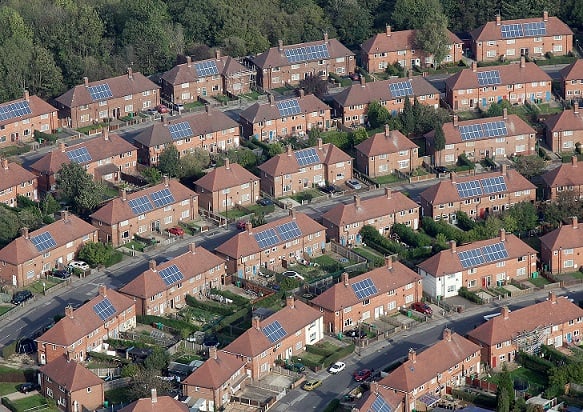
New build housing developers are in need of a re-education if they are to realise the benefits that solar and storage installations pose for their projects.
That was the verdict from a panel of solar and storage installers that have been catering for the thriving new build and social housing sectors at this month’s Solar & Storage Live exhibition.
Joju Solar founder Chris Jardine discussed how his firm regarded the new build solar market, stressing that housing developers needed to come on board with solar and storage due to the respective technologies’ potential to meet building energy efficiency performance codes.
Rooftop solar PV was widely expected to receive a boon from the new build housing industry via the government’s zero carbon homes initiative, which would have mandated every new housing development to generate as much power via on-site renewables as possible from 2016, were it not abruptly cancelled the year before.
The policy decision, made at a time of swinging cuts to renewables, was widely pilloried and decried as “the worst thing the Tories have done” by former energy secretary Sir Ed Davey at an industry event later that year.
However it is now creeping back on the agenda with some housing developers turning their attentions to rooftop solar after continued price reductions.
Last week Conservative MP Laurence Robertson questioned the Department for Communities and Local Government over its possible appetite to strengthen building regulations to ensure all new buildings are developed with solar in mind.
Housing minister Alok Sharma said there were currently no plans to do so, insisting it may not be “appropriate” to mandate a particular technology in this instance. He did, however, point to a possible strengthening of energy requirements in building regulations as set out in the Clean Growth Strategy, a review which could see greater appetite for on-site renewables.
While solar and storage have considerable premise in this area, Jardine said that developers had not yet come on board in significant numbers.
This, he suggested, could be a result of a lack of education within the sector and a remaining penchant for other energy efficiency measures such as double glazing.
Solar, and particularly storage, are commonly seen as expensive additions to a house building programme but offer greater returns than other technologies.
Jardine paid particular attention to the nascent battery storage market which he said was suffering more severely than solar PV as a result of costs. However, he added that this barrier could easily be supplanted by direct legislation covering new build housing developments, adding battery storage as a necessity for planning consent.
This could come under the need to offer grid balancing services as a result of housing developments adding to strains and stresses on the local distribution network, with Merton Council understood to be considering something similar.

